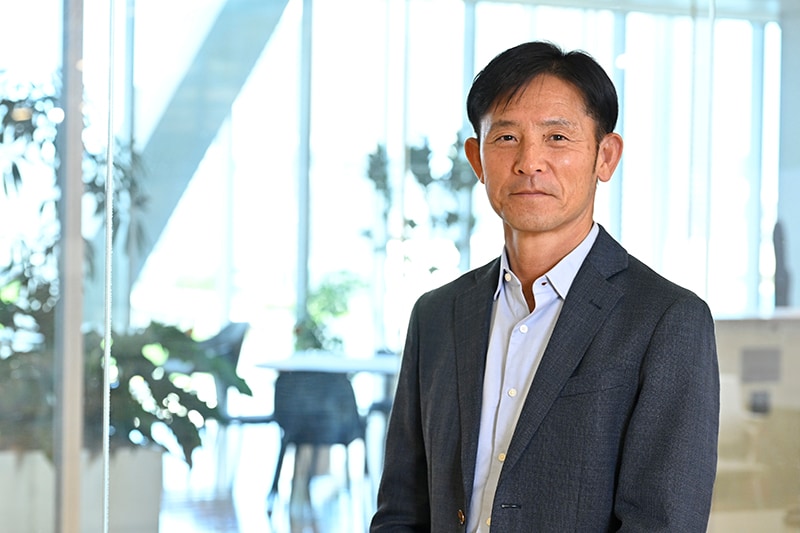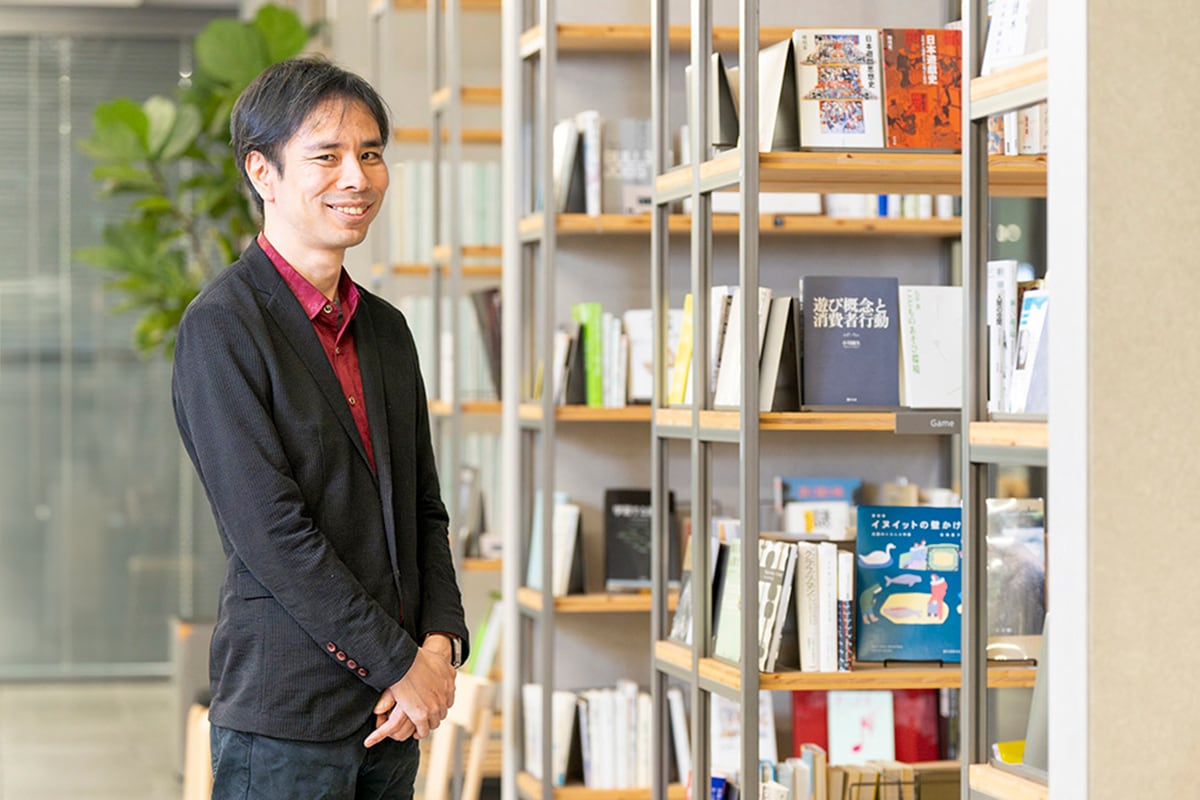People
Series: Inside the Minds of Sony’s Corporate Distinguished Engineers #5 Magdalena Wasowska
Striving to give Sony’s R&D Center a more global outlook
Oct 1, 2021

In this series, Sony’s top engineers discuss their careers, research, and their ideal profile as an engineer at Sony.
In #5, we hear from Magdalena Wasowska, who specializes in security, privacy, and blockchain technologies.
Corporate Distinguished Engineer
Sony certifies its engineers as "Corporate Distinguished Engineer" who formulate and execute technology strategies while identifying signals of change, and support the development of talent in order to ensure Sony’s sustainable growth.
Profile
-

Magdalena Wasowska
Senior General Manager
Distinguished Engineer
R&D Center
Sony Group Corporation
Blockchain has the power to change the world.
Magdalena is currently in charge of several of Sony’s blockchain projects. She believes that this technology will be critical for the democratization and decentralization of information in the future
Blockchain is a technology that I’m very passionate about. Originally, one of the ideas behind the internet was to democratize information. In the early days of the internet, we simply thought of it as a big encyclopedia. A tool that would give everyone equal access to information.

Magdalena is currently on assignment in Japan for 2 years
Nowadays it has grown into so much more. People use it for socializing, for shopping, for banking, and for everything else. However, it’s actually much less democratic. The nature of people means that they seek out a certain type of information, and the big tech companies who control this information react accordingly. Based on your browsing history and your preferences, the algorithms will only feed you correlated information. This is very efficient when you’re looking for something, but it also means that what you are reading isn’t always the whole truth. As a result, we see replication of social stratification also in the digital space.
The current rise of blockchain is just the beginning
What blockchain is trying to do is to go back to the almost “noble” idea of putting the power back into the hands of individual users so that our society becomes more inclusive and fair. Blockchain reshapes information ownership and control, protects rights through immutable records and also builds trust among un-known parties enabling removal of middleman from value transaction. These features have a range of positive effects. For example, they lower the barriers for financial inclusion. Today, if you’re not very wealthy but you would like to send money home to your family, you need to pay a lot of transaction fees. However, with trustworthy peer-to-peer transactions supported by blockchain, you could cut out the middleman and send that money home without any fees. Blockchain will also change the way that we look at digital assets. At the moment, people don’t value their digital assets in the same way as they value their physical assets. Let’s say you’re a gamer, and you buy extra items using the currency in the game. If you no longer play that game, that money is lost. You can no longer do anything else with it. However, blockchain will allow us to hold onto that sort of digital asset. Perhaps you’ll be able to sell it later and get something new.
I absolutely believe that blockchain technology has the potential to change the world. The current rise of Non-Fungible Token (NFT) and cryptocurrency are only the beginning. Just as we thought of the internet as an encyclopedia, and it evolved into so much more, I believe we’re only starting to see the power of this technology.
Education was a way to improve our position in life
Growing up in Poland during a time when there were many restrictions on travel and access to information, this has given her a unique outlook on life, teaching her the value of community, and resilience and courage in the face of hardship.
My childhood was interesting in that we were still living behind the “Iron Curtain” as they called it at the time. We couldn’t travel, there were only two channels on TV, and we had almost no access to information from the Western world. However, when there are restrictions in place, people become inventive and find ways around them.
Another thing I learned was the value of education. Due to the rampant poverty in my country, we had very few career choices available to us. I knew that the only way I would be able to truly improve my position in life was to acquire knowledge. I was curious about so many fields that it was difficult to choose, but I ended up studying mathematics. I’m a logical person by nature, so I loved the beautiful simplicity of mathematical theories and enjoyed unraveling the intellectual puzzles that they represented. One thing that I became aware of through my experience of living in a socialist country was that there was a feeling of equality over everything including gender. So, as a young woman, I wasn’t intimidated about going into a STEM* field. I’ve never regretted my choice to study mathematics because I met so many highly intelligent and fascinating people there.
*Science, Technology, Engineering and Mathematics

Growing up in Poland with abundant nature, her hobby often took place outdoor
Magdalena’s hard work paid off when she graduated from the University of Warsaw in 1992 with a degree in mathematics. By that time, Poland had begun gradually opening up to the outside world.
When the Iron Curtain came down, western investment flooded into the country, opening up many new possibilities for careers. The only catch was that a high level of English-speaking skill was a must. So, I traveled to the UK to study English for six months. This was my first time traveling so far away from my family and friends, and in those days, we didn’t have cellphones that we could use to easily stay in touch. Plus, as you can probably imagine, it was a major culture shock for me. I came from a country, where everything was plain and grey, country where everyone had the same furniture in their homes, to London, a melting pot of culture and colorful in a way everyone was different. This period of my life was both scary and exhilarating, but it taught me that I could make it on my own.

Coming from Poland at the time, London seemed very colorful to her
Bringing together such a diverse group of people from such different nationalities and backgrounds.
In 1996, after coming back from UK and working at a military academy in Poland followed by a brief stay in Germany, Magdalena moved to Belgium with her husband, where they both joined the Sony Group in Brussels.

Sony was the first job offer that I received in Belgium, and so I took it without much thought. However, one thing I can say after 25 years at Sony is that a fairy godmother must have led me to this job. I work with such a fascinating group of people, and there is so much freedom for engineers to experiment and propose things.
When I first joined, our laboratory had 35 people, about 15 of whom were Japanese members and others were from a range of different nationalities and academic backgrounds, and everyone brought something unique to the table. Although our common language was English, this was actually the first time I had ever met a Japanese person, and we had many issues communicating. At the time, we had just begun introducing design tools, so it was often easier to communicate our ideas through drawings. It was at times difficult but also amazingly fun.
At that point, we were already developing very ambitious software. We were working on embedded operating systems, which included writing the internet protocol from scratch. Funnily enough, the first product to use that technology was the first generation AIBO.

Right: First generation “AIBO” which came out in 1999 / Left: Her very first visit to Sony’s Tokyo office in 1996
Diversity is being invited to a party, but inclusion is being asked to dance.
Diversity has remained a prominent theme in Magdalena’s career, and currently, she is managing a program related to diversity and inclusion in R&D Center.
Over the course of my life, I’ve lived in many different countries: Poland, the UK, Germany, Belgium, and now Japan. This has taught me a lot about diversity, different cultures, and communication.
Today, everybody agrees that diversity is a good thing for creativity and innovation. There is a huge amount of data supporting this. So, many companies often begin by recruiting a diverse range of employees. And this often leads to challenges, because diversity means having different opinions, and by adding different opinions, we create conflict. The key to success is inclusion, and that’s far more complicated.
People sometimes say, “Diversity is being invited to a party, but inclusion is being asked to dance.” In other words, they need to feel at home in the new environment. People need to learn how to communicate, how to discuss things, and how to build consensus to reach a common goal. From my experience, one of the best ways to educate people about diversity and inclusion is to experience it. Perhaps by throwing them into environments where people think differently-either a faraway location or a laboratory where they can work on technology outside of their field of specialty. In this way, they can broaden their views and develop a more tolerant mindset.
That’s actually part of the reason why I’m in Japan. R&D center is currently running a program to introduce diversity into management, and as part of that, I have transferred to Japan for two years. That means that very often, I may be the voice of conflict. However, if that conflict can generate discussion, then ultimately, it will give the organization a more global mindset.

Ever since her transfer to Japan, Magdalena has been working from home
We live in exciting times, and given Sony’s wide portfolio of business, I believe that there are limitless ways for engineers to contribute to the future. However, to fully utilize these possibilities, we need to communicate with each other and approach issues from a variety of angles. Diversity comes from people thinking differently and being allowed to voice their own opinions. I would like to create the necessary collaboration and communities for this to happen, and I would like to see more members of Sony who are willing to pursue their dreams and fight for what they believe in.




